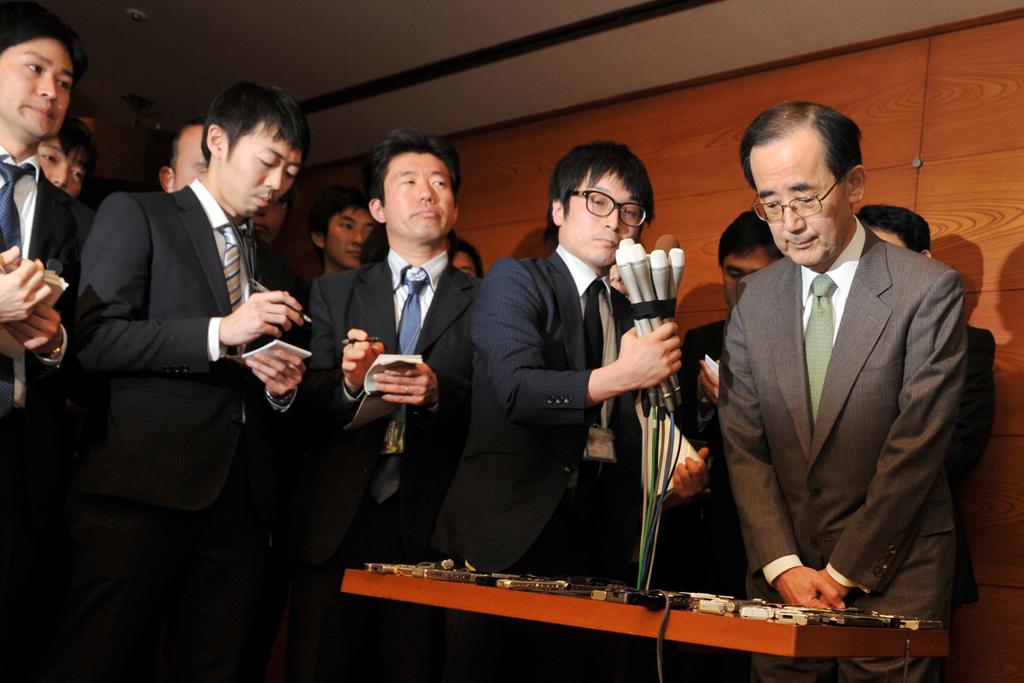Why this week’s Bank of Japan meeting matters
Bank of Japan (BOJ) governor Masaaki Shirakawa (R) meets with the press at the BOJ headquarters in Tokyo on Feb. 5, 2013. Shirakawa has announced that he would step down on March 19, about three weeks before his term ends.
February's Bank of Japan (BOJ) meeting should be less action-packed than January's, which saw unprecedented steps to revive a weak economy. Still, the meeting is important, especially as the central bank prepares to usher in a change in its top policy makers, analysts say. The BOJ concludes a two-day meeting on Thursday, the same day that Japan is scheduled to release fourth-quarter GDP data.
Last month, the BOJ adopted a 2 percent inflation target and pledged to carry out an open-ended asset purchase program from next year, bowing to pressure from Japan's new Prime Minister Shinzo Abe to adopt an aggressive monetary policy to end years of deflation.
Abe's radical new economic policies — referred to as "Abenomics" and expectations of a bold monetary policy have weakened the yen 21 percent against the dollar since mid-November, while Japanese shares have surged almost 45 percent.
According to Martin Schulz, senior economist at Fujitsu Research Institute, further action from the BOJ is unlikely until April.
"The top three governors are on their way out and it is only the first month since they announced the big package in January," he said. "Markets are forward looking and they will be focusing on the new board coming in. I expect it will not be until April that we see further asset purchases."
Yusuke Ikawa, rates strategist at RBS Securities in Japan, also ruled out imminent action from the BOJ and said uncertainty over who will be the next central bank governor could cause market volatility in the short term.
BOJ Governor Masaaki Shirakawa took markets by surprise last week by announcing that he would step down on March 19, the date set for the departure of two of the BOJ's deputy governors and three weeks before his five-year tenure ends in April.
"At the moment the market only knows that Shirakawa will not be appointed as governor, and nobody knows who will be the next governor. This is a big uncertainty overhanging markets and markets will be volatile until the final decision on the next BOJ governor is made," Ikawa said.
Names put forward as possible candidates to replace Shirakawa include president of the Japan Center for Economic Research Kazumasa Iwata, chairman of the Daiwa Institute of Research Toshiro Muto and Asian Development Bank President Haruhiko Kuroda. Iwata and Muto were both former deputy governors between 2003 and 2008.
"Attention has shifted to the new regime. The market consensus seems to be that Muto — who is one of the milder candidates as opposed to the more dovish Kuroda — will be appointed, and I doubt there will be a surprise there," said Izumi Devalier, an economist at HSBC.
"However, the announcement of a name alone will not resolve the uncertainty. The focus will be the two April BOJ meetings, including the publication of the semi-annual report on April 26, when the board will lay out its views on growth and prices," she added.
Yen Watch
Analysts said they would watch closely for any comments the BOJ makes about the yen, which has been at the center of talk about a global "currency war."
The yen, which traded at about 93 per dollar on Wednesday, hit a 33-month low earlier this week. Its rapid depreciation has caused alarm among some of the world's major economies since it gives Japan's exporters a competitive edge in export markets.
The G-20 nations are set to meet in Moscow on Friday and Saturday and recent currency moves are expected to be high on the agenda.
"I do not see any imminent large action from the BOJ due to this uncertainty over the leadership and they [the BOJ] will need to watch the G20's discussion on the yen's movements, so they may need time," Ikawa at RBS Securities said.
Finer details
However amidst the talk of "no action" from the BOJ this week, the finer details of the meeting could be missed.
Ikawa pointed to BOJ member Koji Ishida's proposal to either cut or eliminate the deposit rate, first suggested at the December meeting, but notably absent from the January meeting.
"Some participants think the BOJ will move to lower interest rates on reserves, but personally I think this is unlikely. But the discussion over this issue will be keenly watched, because reducing the interest rate on reserves was proposed to reduce the attractiveness of the yen as a safe-haven in December," said Ikawa.
HSBC's Devalier said market participants will be keen to see if Ishida's proposal has gathered support.
"If it did re-emerge, that would suggest it's not off the table. Market participants are beginning to anticipate a deposit rate cut, but it is not an easy policy decision to implement," said Devalier.
More from our partners at CNBC:
CNBC: Merck takes a hit from Venezuela currency devaluation
CNBC: John Mackey: Obamacare likely to raise costs
CNBC: Yahoo wants to make content, ads just for you
CNBC: Why women are driving the demand for rental apartments
Every day, reporters and producers at The World are hard at work bringing you human-centered news from across the globe. But we can’t do it without you. We need your support to ensure we can continue this work for another year.
Make a gift today, and you’ll help us unlock a matching gift of $67,000!
